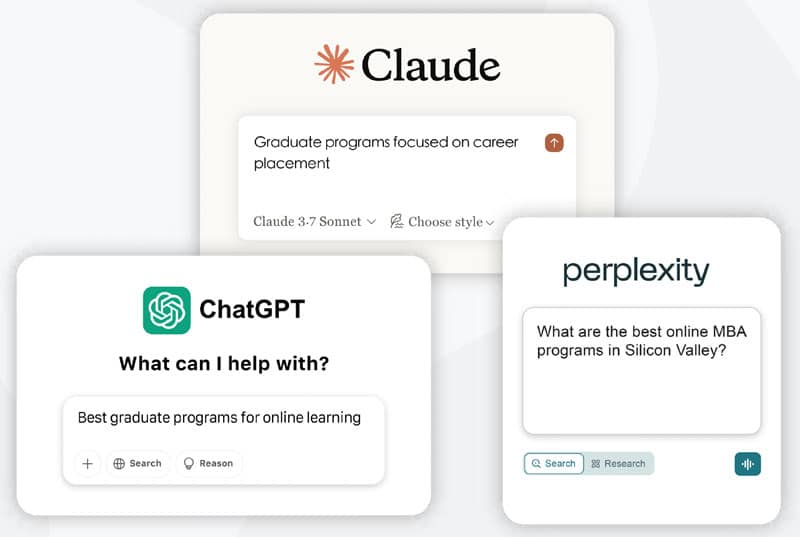Students are switching to AI for search. Are you ready?
- Researchers are reporting a significant shift in search activity this year, with younger users relying more on generative AI tools for search queries
- This trend is especially notable when it comes to prospective student’s searches for study options, with education being one of the most prominent categories for website traffic referred by ChatGPT
- This shift to AI-involved search appears likely to usher in substantial changes in our strategies and tools for search optimisation and search marketing
The early research is in and recent studies are pointing to a broad trend in that AI tools are having a significant impact on search volumes this year. More specifically of interest to international student recruiters, prospective students are increasingly making use of AI to explore study options.
The underlying trends here are the rapid adoption of generative AI tools – such as ChatGPT, Perplexity, and Claude – along with the integration of AI in general search, most notably the AI Overview feature introduced on Google search last year.

Talking about my (college-aged) generation
One newly released study – Everspring’s 2025 AI Trend Report – examined more than 450,000 student searches from January 2024 through April 2025. Across that sample, Everspring found that ChatGPT had become the "default search tool for Gen Z" with two in three prospective students indicating that they preferred a generative AI search over Google.

A related analysis from search marketing specialists Semrush finds that education is one of the top categories for Internet traffic referred by ChatGPT (second only to "online services"). Semrush notes as well that while the ChatGPT user base is small compared to Google's, the ChatGPT "user base shows higher concentrations among certain segments." In particular, nearly half of ChatGPT's users (46.7%) are in the key 18-to-24-year-old cohort (in other words, the college-aged market segment) whereas only 1 in 4 Google users (24.7%) are in that same age group.
It should be said that Google's user base is still considerably larger (1.6 billion college-aged users as opposed to 265 million on ChatGPT), but we're paying attention to this now because user behaviour around search is changing quickly. "The student search journey is migrating fast. AI tools now act as advisors, influencers, and gatekeepers all in one," says Everspring.
Another recently released study – Carnegie's College Choice Trends Report – found that the use of ChatGPT among high school seniors for college search doubled between 2024 and 2025. "Use of AI in the college search process is accelerating rapidly," says Carnegie Research Specialists Conor Rayel. "In 2023, just 4% of seniors reported using AI tools like ChatGPT to explore colleges. That figure climbed to 10% in 2024 and now stands at 23% in 2025."
What does this all mean?
"AI is rewriting how students find programmes, faster and more profoundly than most universities realise," says the Everspring study. "Generative AI tools are collapsing the search journey, delivering full answers about your institution – and your competitors – before a prospective student ever visits your site. In doing so, they’re upending both paid and organic performance and redefining what it takes to stay competitive…Student recruitment depends on AI presence."
Part of the solution, Everspring adds, is to "audit your content for AI visibility. Identify where you’re losing ground to AI Overviews and restructure content to be semantically rich, clearly formatted, and citation-friendly. Machines need clarity, not just keywords."
More fundamentally, we should understand that this is a game-changing development – or even a series of game-changing developments – when it comes to search optimisation and search marketing.
Everybody with a website now has to consider how visible that site is in the context of AI search and AI Overview-type results on conventional search engines. We are going to see new strategies and new tools coming to the fore as a result, and our collective journey up that part of the digital marketing learning curve is beginning in earnest this year.
For additional background, please see:
















